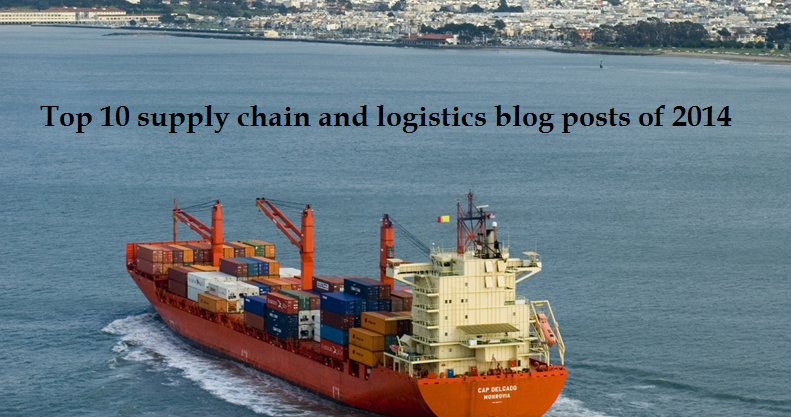Here are the top supply chain and logistics blog posts of 2014
2014 is over and a new year has begun. We look back at the content we created and shared in 2014.
Looking at content focused on the supply chain and logistics industries, there are three topics which garnered the most interest:
- The use of social media and content marketing;
- Supply chain talent;
- Technology.
Here are the top ten supply chain and logistics blog posts of 2014 based on pageviews. #1 receiving the most pageviews.
1. Internet of things and its impact on supply chain management
The Internet of Things trend is quickly approaching and will impact the way we live and work through increased productivity and efficiency. Supply Chain Management will continue utilizing these advanced technologies to improve factory workflow, increase material tracking, and optimize distribution to maximize revenues. Read the full blog post.
2. Social media and the logistics and supply chain industries
Within the past five years companies within the logistics and supply chain industries have begun to see social media as a strategic tool and have begun to actively use and leverage social media. A survey conducted by Fronetics Strategic Advisors looks, broadly, at the use of social media within the logistics and supply chain industries. The report discusses use, motivations, preferences, benefits, and challenges. Read the full blog post.
3. The Santa Supply Chain [Infographic]
Santa’s supply chain was the first to run “in the cloud.” Read the full blog post and check out the infographic.
4. Social media and content marketing works, just ask freight logistics company Cerasis
Looking at the manufacturing, supply chain, logistics, transportation, distribution and freight industries there are a few companies that have emerged as leaders – companies that exemplify the business value of creating and executing digital, social media, and content marketing strategies. Cerasis, a freight logistics company, is one of these companies. Read the full blog post.
5. How to solve the supply chain talent crisis: a supply chain recruiter shares his ideas
The supply chain industry has a talent crisis. The question is: how can we solve this crisis? To answer this question I turned to Rodney Apple, founder of the SCM Talent Group. Apple has worked as a supply chain recruiter for the majority of his 19+ year career within the staffing industry and he has filled more than 1,000 positions within the industry ranging from executive-level in Fortune 500 headquarters settings to leadership and staff-level roles across large networks of manufacturing and distribution facilities within North America. Apple’s role affords him the ability to witness the talent crisis from the perspective of the industry, the company, and the job seeker. Read the full blog post.
6. Cerasis talks content marketing and social media (guest post by Cerasis’ Adam Robinson)
The purpose of this series of blog posts is to give others in our industry and especially those in the manufacturing industry, a guide to create an effective digital, social media, and content marketing strategy which will produce results for your company. If you have followed the Cerasis blog since its launch in March 2013, you have noticed that we work really hard at executing our strategy. The reason we work so hard is because we are passionate about educating the marketplace on information that matters to them. In that way, we want to be the de facto expert in the manufacturing and logistics industries. If we can help those who are our customers and potential customers (manufacturers and distributors) with best practices around logistics and freight, as well as manufacturing industry news, we are continuing our mission of driving long term value (even if we give the information away for free). The result (we hope and have seen) is that people view us as the expert and will want to engage us in a long term relationship as their logistics services provider. We hope this is helpful and you learn something from it! Read the full blog post.
7. How social media can make David a formidable challenge to Goliath
3PL provider Coyote Logistics is one of the fastest growing companies in North America. The company’s incredible growth (five-year growth: 3,585 percent) and tenacious spirit has not gone unnoticed. Forbes included Coyote in its list of Most Promising American Companies; Supply & Demand Chain Executive listed Jeff Silver, Coyote CEO, as one of their “Pros to Know;” and the company was listed as one of the best places to work by the Chicago Tribune. There are undoubtedly many factors that have contributed to the success of the company. Coyote’s approach to social media is likely one of the company’s keys to success. Read the full blog post.
8. Want to fill the supply chain talent gap? Re-brand the supply chain.
Here’s the thing – the supply chain industry is perceived by those outside the industry as having no “wow” factor whatsoever. If the supply chain industry is going to attract new and qualified talent, it needs a face lift. It is time for the supply chain industry to re-brand itself. Read the full blog post.
9. 10 free tools to help you measure your social media ROI
Without a comprehensive social media strategy, your message may be getting lost in the chatter. There are a number of tools that will help you monitor your online influence and, effectively, make the necessary adjustments to ensure your efforts are paying off. Here are 10 free tools to help you measure your social media ROI. The basic features of each of these tools are free. Read the full blog post.
10. Supplier Scorecards: Tracking Supplier Performance
Regularly tracking your relationship with your suppliers and their performance toward your expectations is critical to ensure the success of your business. One mechanism for tracking this is the supplier scorecard. A scorecard is in essence a report card for your supplier. Supplier scorecards when used effectively can help maintain a healthy supply chain and will benefit both parties. If not used effectively supplier scorecards can damage the supplier relationship and hurt both businesses. Read the full blog post.


